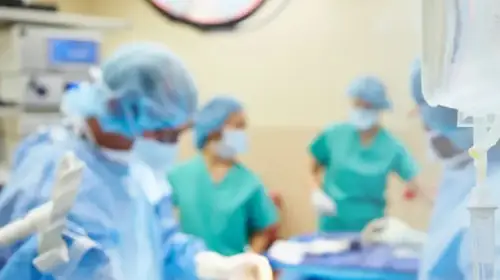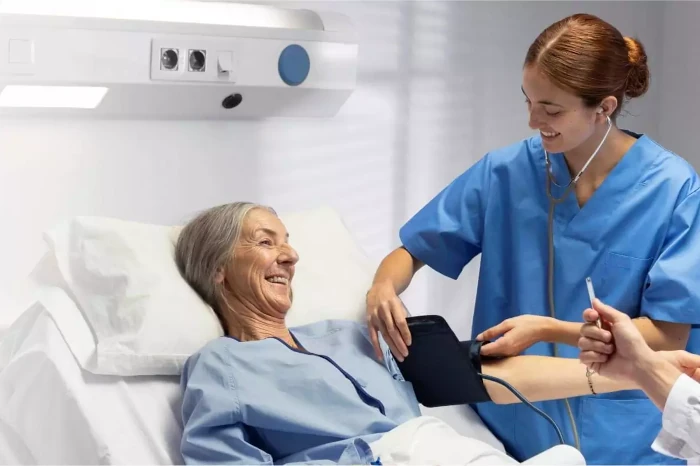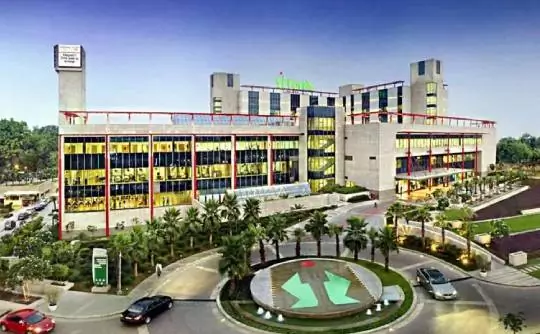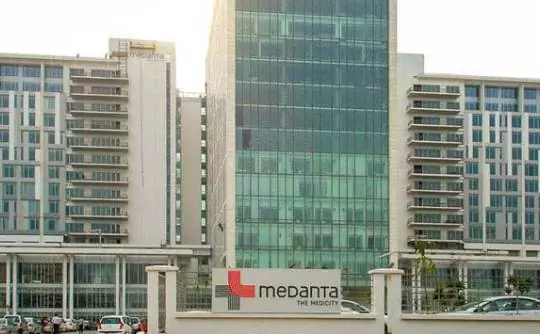

A significant cost to consider when planning an intestine transplant in India is the surgeon's fee. IndiCure Health Tours connects you with board-certified surgeons who are highly experienced and have a proven track record of successful transplant surgeries. Although the surgeon's fee may vary depending on their experience and reputation, you can rely on IndiCure to recommend professionals who prioritize your safety and ensure excellent results for your intestine transplant surgery in India.
Selecting an accredited surgical facility with skilled and qualified medical professionals is essential for the success of an intestine transplant in India. Major cities like Mumbai and Delhi often provide advanced medical infrastructure and access to highly experienced surgeons, which can contribute to higher costs. To ensure the highest standards of care and patient safety, IndiCure Health Tours only recommends top-tier surgical facilities located in these larger cities.
Surgery-related costs include both pre-and post-operative expenses. Pre-operative costs are influenced by factors such as the patient's age and medical condition, determining the necessity and type of investigations needed. Post-operative expenses may involve prescribed medications and subsequent follow-up appointments.
In an effort to enhance patient care, new techniques and technologies are frequently incorporated into the surgical process. However, these innovative advancements can lead to an increase in the final intestine transplant cost in India.
At IndiCure Health Tours, we streamline the majority of expenses for your intestine transplant in India, offering an all-inclusive and budget-friendly package that is customized to your specific needs and financial requirements. Once we receive your medical reports, your dedicated case manager will provide an estimated intestine transplant cost in India based on discussions with the surgeon.
The final cost of the intestine transplant in India, however, will be confirmed after your in-person consultation with the surgeon.

We Help you Choose the Right Treatment, Surgeon & Hospital

We Arrange Video/Telephonic Consultation with the Surgeon

We Assist you with Visa & Accommodation

We Receive you at the Airport and Drop you at Hotel/Hospital

We Assist you the at Hospital & Provide Post Operative Support
IndiCure Health Tours enables exclusive savings on your medical travel to India. We partner with best hospitals in India to negotiate special rates, ensuring you get the best possible price on your healthcare in India when you plan your medical travel with us.

Here is a set of questions you should consider asking while planning your journey for an intestine transplant surgery in India.
Prepare to answer questions about your:
Intestine transplantation (also known as intestinal transplantation or small bowel transplantation) is a surgical procedure that replaces the small intestine in patients with chronic or acute intestinal failure.
The human body requires nutrition to function properly. If they can't be consumed owing to intestinal failure, they're given intravenously by complete parenteral nutrition, which involves placing a catheter in the patient's neck, arm, chest, or groin. Because using a catheter for an extended time increases the risk of infections, bone dislocation, and liver illness, an intestinal transplant becomes the only long-term treatment for intestinal failure.
Intestinal failure can occur at any time after birth or later in life. In the following situations, an intestinal transplant may be required:
Intestinal failure can be caused by a variety of factors, including nutritional, viral, traumatic, and metabolic problems that impair normal anatomy and physiology.
The inability to absorb nutrients, fluids, and electrolytes from food, which happens in case of small intestine failure can be life-threatening. Homeostasis cannot be maintained without these vital substances and so would be the ability to maintain energy balances without the small intestine working.
Small bowel transplant: Only the small intestine is transplanted
Combined intestine and liver transplant: In addition to a small bowel transplant, you may have a liver transplant also.
Multivisceral transplant: A multivisceral transplant often includes a pancreas transplant. Some people also receive a stomach or colon transplant.
Modified multivisceral transplant: You receive transplantation of the stomach, pancreas and intestine.
In the most basic and common graft, an isolated intestinal graft, only sections of the jejunum and ileum are transplanted.
If your medical condition falls into one of the following categories, you may be a candidate for an intestinal transplant:
Before the intestinal transplant, the patient is assessed thoroughly and made to undergo a battery of tests to ensure that the donor is healthy enough to survive the surgery. The test includes blood testing and various other investigations, physical assessment by the physician, the surgeon, an anesthetist, gastroenterologists, dietitians and other psychological tests.
The Intestine Transplant Selection Committee will present and discuss your results once your transplant evaluation is completed in order to provide the best possible recommendations about your ongoing medical treatment, surgical intervention, and suitability for intestinal transplant surgery.
You will begin the waiting period once you have been listed, and you may be called for transplant surgery at any time. The length of the wait is determined by the availability of the organ. You will be seen in the transplant clinic throughout this time and will need to have follow-up testing at regular intervals.
The length of surgery varies depending on what type of intestinal transplant you're having. On an average, the intestine transplant takes about 8-12 hours.
Your blood vessels will be linked to the blood vessels of the transplanted intestine once the diseased bowel is removed. The latter will be linked to your intestines or whatever remains of them.
Your surgeon will divert a small portion of your small bowel through a hole in your abdomen called the stoma, according to the rules of an ileostomy.
Following the procedure, your body's digestive waste will travel through the stoma and into an external pouch. Your transplant team will be able to examine the health of your transplanted intestine as a result of this.
You will be shifted to the transplant intensive care unit (ICU) after the transplant surgery, where you will stay for a few days depending on how fast you recover. To ensure that the transplanted intestine survives in your body, you will need to take anti-rejection medications for the rest of your life.
The recovery procedure following an intestinal transplant is a long and sluggish one that tries to gradually improve the patient's health and fitness. Resuming normal daily activities could take up to six months.
Because of advances in medical research, the number of people who have survived has increased over time. The survival rate of intestinal transplants is currently 70%, and in some cases much higher.

Gurgaon
Fortis Memorial Research Institute (FMRI), the flagship hospital of Fortis Healthcare, is a multi-specialty, quaternary care hospital and is counted among the best hospitals in India and the world. The hospital is considered as "Mecca of Healthcare" and a referral hospital, not only in the entire Asia Pacific but much beyond.
The hospital boasts of an enviable International faculty- the clinicians considered to be among the best doctors in the world and even specialty nurses offer nothing but the best in clinical care. The hospital has the most modern, state-of-the-art, cutting-edge technology in the hands of the most technically sound technicians, who offer clinical excellence beyond comparison.

Delhi
The Medicity is one of India's largest multi super-specialty institutes located in Gurgaon, National Capital Region (NCR-DELHI). Founded by one of the most renowned cardiac surgeons in India, Dr. Naresh Trehan, Medanta was established with the aim to provide the highest standards of medical care to patients backed by clinical research.
Spread across 43 acres, the institute includes a research center, medical and nursing school. It has 1250 beds and over 350 critical care beds with 37 operation theatres catering to over 20 specialties. Backed by the latest and most advanced technology, the institute is counted among the best medical institution in the world and attracts lots of patients from across the globe.
Yes, an Intestine transplant is very much possible in India. Short bowel transplants, often known as intestinal transplants, are procedures that replace damaged intestines with healthy ones. Other organs can be transplanted at the same time if necessary.
The Intestinal Transplant Registry reported 1-year actuarial patient survival rates of 69 percent for isolated small bowel transplants, 66 percent for small bowel-liver transplants, and 63 percent for multivisceral transplants, as well as graft survival rates of 55 percent for ISB and 63 percent for SB-L and MV, according to the registry.
Although a living donor can contribute a portion of the intestine, most intestinal transplants require an entire organ from a deceased donor. Furthermore, the majority of intestinal transplants are done in conjunction with a liver transplant.
Most people can live without a stomach or large intestine, but living without a small intestine is more difficult. Nutrients must be injected directly into the bloodstream (intravenous or IV) in liquid form when all or part of the small intestine is removed or stops working.
In addition to the actual Intestine Transplant cost in India, there are several other expenses you should plan for when organizing your medical trip to India. These include:
By accounting for these additional expenses along with the Intestine Transplant cost in India, you can create a comprehensive budget and ensure a smooth, comfortable recovery experience.
Enhance your medical journey to India by availing these extra services.
Traveling abroad for medical reasons may be challenging. With our experience of over a decade and working with the best surgeons and top hospitals in India, we help make your medical tour easier and safer for you. We will guide you at every step of the way and make end-to-end arrangements for your surgery, travel, and stay.
Ramandeep Dhaliwal
I had great experience having rhinoplasty through Indicure. Dr. Ruchika from Indicure has helped me in finding best plastic surgeon, answering all my questions...
Read More
Joshua Archer
My name is Joshua Archer I'm from New Zealand, bay of plenty, kawerau I opted for the bypass surgery in January 2023 but planned it in advance for 28 September found IndiCure...
Read More
Kera Ren
Absolutely loved my experience with IndiCure - from first inquiring to meeting the surgeon pre op to my follow up post op. The surgeon was extremely approachable...
Read More
Andreana Paul
Had a wonderful experience. Visited India for my plastic surgery. From sending mails, airport pickup, comfortable accommodation and, to smooth hospital appointment booking...
Read More
Brandi Luce
I had the privilege of using Indicure's services for a cosmetic procedure that I had wanted for a long time but had always been apprehensive about. Ruchika helped me...
Read More
Jade M
Indicure Health Tours went above and beyond my expectations. They helped me with every aspect of my journey and were professional, kind and caring. I was...
Read More
The content on the website (www.indicure.com) is intended to be general information and is provided only as a service. All photographs on our website of before and after results are examples only, and do not constitute an implied or any other kind of certainty for the result of surgery.
Learn about IndiCure Health Tours' comprehensive editorial policy that strives to deliver trustworthy, helpful, relevant, accurate and people-first content on medical tourism in India.
It is not medical advice and should not be taken as medical advice. It should not be used to diagnose or treat a health condition and is in no way meant to be a substitute for professional medical care. You are advised to see a surgeon in person to assess what surgery may or may not accomplish for you.
It is also important to keep your expectations realistic and to understand that all surgical procedures carry risks and should never be taken lightly.